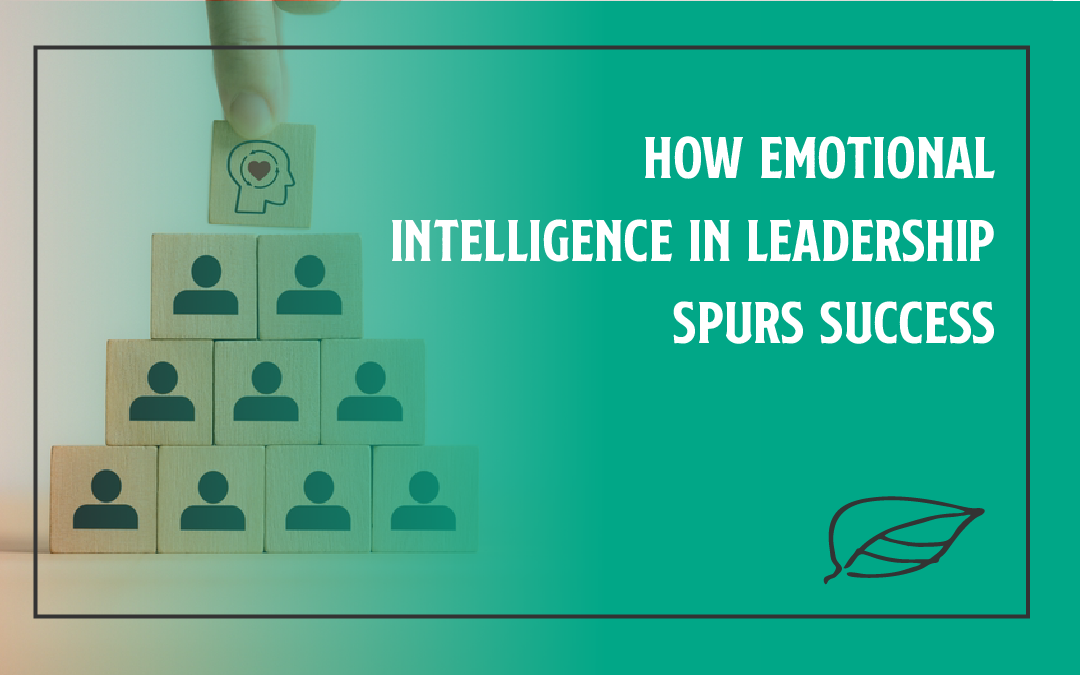You’ve probably heard the term emotional intelligence thrown around. Have you ever stopped to think about what your career really means? Dream of leading? Sharpen your emotional intelligence. Prepare for a major shift. Prepare for a big shift. This alters everything. Completely. Seriously. It’s a game-changer; think of it like this: a leader who can manage their emotions effectively is far more likely to inspire and motivate their team. A leader who struggles with their emotions may struggle to connect with and support their team. Being kind is great, but truly connecting with others—really understanding them—makes you a much better leader.
Prepare to shine—this will make all the difference! People will notice. Leading with emotional intelligence changes everything. Better team leadership is one result. A better workplace is another. Problem solving? This does that too! Technical skills can get you on the ladder, but they won’t always get you to the top.
Think about the best leaders you’ve known; they likely had something more, didn’t they? That something is often strong emotional intelligence, a key leadership skill. Want a stronger team? Coaching will improve, stress will decrease, and conflicts will resolve more quickly. Teamwork improves. People work better together. Lots of bosses now see how important these thinking skills are. Leaders know: these people are crucial.
Studies published in places like the Harvard Business Review even indicate that people value emotional intelligence over hard skills. I want to know the explanation. Because leaders with high emotional intelligence build resilient and motivated teams. Team morale and company success? You’ll notice a real difference with this skill; it’s that important. Better team performance is a side effect.
Table Of Contents:
- What Is This Emotional Intelligence Anyway?
- Spotting a Leader Low on Emotional Juice
- The Four Pillars of Emotional Intelligence
- Why Your Emotional Intelligence in Leadership Drives Success
- Practical Ways to Boost Your Emotional Intelligence as a Leader
- Conclusion
What Is This Emotional Intelligence Anyway?
So, what’s the big deal with emotional intelligence, or EQ? Knowing your feelings and handling them well is what matters. It means reading people, knowing what makes them tick, and influencing their emotions; this includes your team and those you manage.
Psychologists John Mayer and Peter Salovey first talked about this concept back in 1990, and extensive research can be found on platforms like Google Scholar. But it was Daniel Goleman who really brought it into the spotlight. According to him, a leader’s emotional intelligence is more important than their intelligence quotient or technical abilities. Good leaders need this.
According to Goleman, successful leaders consistently demonstrate strong emotional intelligence. This doesn’t mean technical skills are useless; they are often the basic requirements for many jobs. But to truly lead, especially in complex situations like digital transformation or leading change, you need something more, and this is where a high-degree emotional intelligence comes in. This is where EQ steps in; it’s about how you handle yourself and your relationships, shaping your leadership style.
Effective leaders often have high emotional intelligence; research confirms this improves job performance. People with strong emotional intelligence often stay calmer under pressure and in stressful situations. Emotionally intelligent leaders excel at conflict resolution; they treat colleagues with empathy. Put them in charge and watch them go! These are the kind of people you want leading a team; their management expertise is a big benefit. They’re essential—I’d be lost without them. Seriously.
Learning to understand emotions is a journey, not a destination. It’s not just a personality trait you’re born with; it’s a set of skills that can be learned and honed through conscious effort and leadership training. Get a grip on these key concepts—your leadership potential will explode! It really works.
Spotting a Leader Low on Emotional Juice
Ever worked for a boss who just didn’t get it? Maybe they flew off the handle easily. Perhaps their team members felt hurt by what was said, but the speaker didn’t see it. They may have been oblivious to the effect of their communication style. Workplace drama and a bad work environment can sometimes point to a lack of emotional intelligence.
One clear indicator is difficulty managing or expressing feelings appropriately. Such leaders might dismiss concerns from their team or support team. They might struggle with really listening to what people are saying, failing at active listening. Think about it: are your chats with your boss often strained? Does your leader tend to blame others when things go wrong? Leadership effectiveness suffers when these things show up. Poor leadership is often marked by these traits.
Sudden outbursts or a constant negative attitude can also point to low EQ. Good leaders connect with people; they understand and care about others. Think about how you interact with others; is it effective? Any chance of upgrades? I sure hope so! Empathy is key; you need to be able to sense what others are feeling. Recognizing these signs can help you, or others, see where improvement is needed to develop emotional intelligence.
A leader with low emotional intelligence might also struggle to build trust within their leadership team. This can manifest as micromanagement, an unwillingness to delegate, or a failure to acknowledge the contributions of others. If people are afraid to speak up, the whole team feels it. Morale and performance plummet as a result. Leading change is tough. Trust and open communication are especially important then, because without them, things can really fall apart.
It might be tough for these leaders to get their teams excited and build strong bonds. Their interactions might be primarily transactional rather than transformational. Without the ability to connect emotionally, they cannot foster the kind of environment where team members feel valued and understood. Without addressing this, a leader’s positive influence is weakened. Their contributions aren’t making a difference; we need to find a better solution. Things aren’t going well because of them.
The Four Pillars of Emotional Intelligence
Emotional intelligence isn’t just one single skill; it’s usually broken down into four main parts, often referred to as core components. Tell me—what are my best features? Let’s hear them! Knowing them makes all the difference. This will show you how. It’s like a self-assessment but better. You’ll see places to focus on to strengthen your leadership abilities; for example, maybe you could work on delegation or public speaking. Knowing yourself, managing yourself, understanding others, and building relationships—these are all key parts of the whole. Let’s look at each one.
1. Self-Awareness: Knowing Yourself
Self-awareness is the absolute foundation of high emotional intelligence. Knowing what you’re good at and where you could use some improvement is really important. Teamwork suffers when we ignore our feelings. Teamwork improves when you know what you’re feeling. It’s about an honest look inward; this deep self-awareness self-awareness is crucial.
It sounds simple, right? But many people overestimate their self-awareness. Research by Tasha Eurich found that while 95 percent of people think they are self-aware, only about 10 to 15 percent actually are. The space between where you are and where you want to be emotionally creates challenges. Filling this void helps you grow emotionally. A team’s success depends on everyone knowing themselves. If team members lack self-awareness, it creates problems and makes it harder for the team leader to be effective.
Increased stress and decreased motivation? Yeah, that’s the outcome. To lead others well, you first need to lead yourself well; this starts with knowing yourself and understanding your inherent personality traits. A 360-degree view of how others see you—from your team and colleagues—offers a powerful way to check your self-perception. You rate yourself, and then compare this to how your boss, peers, and direct reports see you. See how you behave and how others see you; this helps you become a better leader. Growth depends on this.
Check in with yourself. Are you walking the walk? Your beliefs: are you truly living them out? Or is there a disconnect? Listen to criticism; it helps you see how your actions affect those around you. Level up! Apply what you know to improve. This component forms the basis of self-awareness self-management social awareness relationship management.
2. Self-Management: Keeping Your Cool
Self-management is all about controlling your emotions and impulses. Stressful situations? Piece of cake! You can keep your cool. It’s all about keeping your chin up; even obstacles can’t stop you. Thinking before acting is a really important skill for any leader who wants to be good at self-management.
Leaders who struggle with self-management often react impulsively. They might find it hard to keep their emotions in check. A reaction is usually automatic and quick, but the more attuned you are to your EQ, the better you can shift from a quick reaction to a thoughtful response. You really need this skill when the heat is on. Self-management and strong relationships? A good life needs these things. Think of it like this: Can you stay calm and collected during a stressful meeting? Can you read the room and adapt to the situation? You can do it with this skill; it’s that easy.
Sometimes you just need to pause. Take a breath. Maybe step away for a minute or call a friend from your professional network. Do whatever helps you collect your thoughts and maintain a positive outlook. You’ll handle tough situations and stress much better. Your personal organization directly impacts your team’s success; a calm, positive leader builds a productive team environment. It’s all connected.
Good self-management means being ready for anything and taking the initiative. Thinking on your feet and making quick choices is what it’s all about. Without these traits, even the best plans can falter. Think of a basketball player who can only perform one play. That player won’t be very successful, will they? Leaders who can manage their own emotions are better equipped to handle unexpected changes and proactively seek solutions. This aspect of self-awareness self-management social awareness helps build resilience within the team.
3. Social Awareness: Reading the Room
Beyond understanding your own feelings, you need to get a sense of others’ emotions. Social awareness is your skill in picking up on the emotions of people around you. Team members are affected by the social climate of the workplace; you need to understand this. It’s about looking outward and tuning in; a cornerstone of social awareness relationship management.
Leaders who are good at social awareness practice empathy. Colleagues’ feelings and opinions matter to them; they strive to understand. Teamwork and communication get a boost. The outcome is better for all involved; a positive result for everyone. Empathy—it’s not just about feeling what others feel; it’s about truly understanding their perspectives. Communication and collaboration improve when team leaders understand their people. Good leaders need this.
According to leadership development firm DDI, empathy is a top leadership skill, and leaders who are strong in it perform significantly better in areas like coaching and decision-making. Another study, mentioned by the Center for Creative Leadership, showed that managers seen as empathetic by their direct reports were also rated as better performers by their own bosses. You can’t have a great team without understanding; it’s a must-have. Think of a sports team, a band, even a family. Everyone needs to be on the same page. Communicate with empathy; it strengthens your team and improves social skills. This boosts not just team morale, but your own leadership effectiveness as an effective leader.
Understanding your organization goes beyond the official charts. You need to see the real power structure, the unwritten rules everyone follows, and how things get done behind the scenes. This is organizational awareness. Effective organizational leadership improves with this approach. Leadership improves. This broader understanding is part of self-management social awareness relationship management.
4. Relationship Management: Building Bonds
Relationship management is about using your awareness of your own emotions and those of others to manage interactions successfully. Improving lives—that’s our goal. Improving lives—that’s what we do. Guide and teach them. It’s all within your power. Disagreements are a breeze for you. You’ll easily smooth things over and create harmony. This is your moment to show how well you connect with others—your high emotional intelligence is on full display!
Lots of folks try to dodge arguments. Ignoring problems only makes them bigger. They’re a real energy and time suck. SHRM studies show that unresolved workplace conflict eats away at company time. Gossip and lost productivity really hurt team performance. The strain is showing—both in what we have left and in the team’s attitude.
Teams that succeed talk openly and jump on problems right away. This means being prepared to have those difficult discussions that often get avoided. Ignoring problems will only create more problems down the road. Solid relationships are essential for success and happiness; think about your closest friends and family—they are your support system. Employees consistently rank respectful treatment as a top factor in job satisfaction. Positive work relationships build respect and a better atmosphere. A healthy company culture follows naturally.
Leading change effectively means inspiring others; that’s a key component. Teamwork makes the dream work, and strong leaders know how to get everyone on board and working towards the same finish line. They make their ideas perfectly clear. The full cycle of self-awareness self-management social awareness relationship management culminates in this ability to positively influence others.
Here’s a table summarizing the core components of emotional intelligence:
| Pillar | Description | Key Actions for Leaders |
|---|---|---|
| Self-Awareness | Understanding your own emotions, strengths, weaknesses, values, and impact on others. Ability to recognize emotions as they happen. | Seek feedback, practice self-reflection, identify emotional triggers, understand your personality traits. |
| Self-Management | Managing your emotions and impulses, adapting to changing circumstances. Ability to stay calm and maintain a positive outlook. | Practice stress-reduction techniques, pause before reacting, remain adaptable, manage time effectively. |
| Social Awareness | Sensing others’ emotions, understanding their perspectives, and taking an active interest in their concerns. Organizational awareness and empathy are essential skills; imagine trying to work effectively without understanding your coworkers or the company’s structure! It’s impossible. | Practice active listening, observe non-verbal cues, show empathy, understand team dynamics. |
| Relationship Management | Managing relationships to move people in desired directions. Become a leader. Master conflict resolution. Build strong teams. Level up your coaching and mentoring skills. Having these skills is a big advantage; they’re practically priceless! Influence positive change within your group. | Communicate clearly, inspire and influence others, resolve conflict constructively, build strong bonds and a supportive professional network. |
Why Your Emotional Intelligence in Leadership Drives Success
Now you see the components. But why is strong emotional intelligence in leadership so directly tied to better results and overall leadership effectiveness? Leaders set the tone. If a leader lacks EQ, it can ripple through the entire organization. Employee and team member engagement might drop. High employee turnover really hurts. High costs derail the company’s carefully laid-out plans; a significant setback. It’s a big deal; business development and financial planning are seriously affected.
You’re probably amazing with the technical stuff. But if you can’t communicate well with your team, those skills can be overshadowed. If you struggle to collaborate or inspire, your technical prowess won’t be enough. Good relationships are easier to build when you understand your feelings. Positive team dynamics, genuine teamwork, and a great workplace culture all depend on this. Top-notch leaders really shine in these areas.
The positive effects are numerous and impactful; people benefit greatly. For you as an effective leader, higher EQ can mean faster career progression and more respect. For your team, it means better morale, higher engagement, and increased productivity which boosts team performance. Think of it this way: a solid company culture boosts the chances of a smooth and successful digital transformation. That’s like throwing gasoline on a bonfire! Employee retention is directly linked to increased revenue. Have you considered…? less hiring and training costs equals more money for the company. For instance, a CareerBuilder survey found 71% of employers value emotional intelligence more than IQ. Leadership success depends on this; it’s that vital.
As a leader, what kind of mark are you making? Emotions are contagious; your feelings spread to your team. How well you connect with people changes how motivated they are and how they see you as a leader. Leadership improves when you boost your emotional intelligence; the result? High performance starts with a team. Everyone should contribute; let’s achieve something incredible together. Think of the impact a team like that could have! Positive outcomes are a regular result of this leadership approach; it benefits everyone involved. Transformational leaders, known for inspiring and motivating teams, consistently demonstrate high emotional intelligence.
Furthermore, leaders with a high degree of emotional intelligence are better equipped for leading change. Change initiatives often evoke strong emotions in employees, and an emotionally intelligent leader can navigate these reactions with empathy and skill. Explaining the reasons for change clearly, answering questions, and getting everyone on board are key to any successful leadership plan.
Practical Ways to Boost Your Emotional Intelligence as a Leader
Okay, so you’re sold on the importance of emotional intelligence. Level up? The good news is that EQ is not fixed; it’s not merely a static personality trait. Intention and practice: that’s the key to improving your emotional intelligence. Ready to strengthen your emotional intelligence and increase your emotional maturity? Here’s how. It’s actually pretty straightforward. No need to worry; you got this!
Start by keeping a journal. Every day, jot down situations where your emotions played a big role. How much they matter is really something. Did it shift how you acted and reacted? Did things work out well, or not so well? Emotional self-awareness grows from taking time to consider your feelings. The more you reflect, the better you get at recognizing and naming your emotions. Improved mental well-being often goes hand-in-hand with more meaningful relationships; think closer family bonds or deeper friendships. You’ll know what to repeat and what to change.
Consider getting 360-degree feedback from your manager, peers, and direct reports. Self-awareness is a big help; it really boosts leadership skills. Actively ask for feedback from your manager, colleagues, and team members. Also, do your own honest self-assessment. Comparing these views can show you blind spots. Leadership skills and emotional intelligence get a boost; this shows you where to focus your efforts.
Practice active listening. This means really focusing when someone is talking. Put away distractions. Don’t just wait for your turn to speak. Show you’re engaged by nodding, making eye contact, and paraphrasing what they said to confirm understanding. Listening to and valuing others is a fundamental aspect of strong social interaction; it directly impacts your ability to connect meaningfully with people. Improved social skills are a natural result.
Notice how you feel and learn to handle those feelings when things get tough. If you feel a strong emotion coming on, pause. Try to understand why you’re feeling that way. This reaction—what started it? Sharpen your emotional awareness; develop the ability to stay calm, even in stressful situations. Life is easier with this skill; you’ll use it all the time. You’ll develop empathy, which is the ability to understand and share the feelings of another. You’ll manage emotional situations more effectively once you understand them better. A major development has occurred. Prepare for a rethink. Everything we thought we knew? Forget it. With this new information, the old stuff is now completely irrelevant; it’s history. It shifts everything.
Leadership training or an online course could really boost your skills. There are many resources available, some offered by higher education institutions or through specialized online leadership programs, that focus on developing emotional intelligence and leadership skills. Structured learning and practical tools are provided by these programs. Investing in your EQ development is an investment in your leadership future and overall management leadership capabilities.
Another simple yet powerful method is to practice mindfulness. Even a few minutes of mindfulness meditation each day can help you become more attuned to your present emotional state. This teaches you to simply observe; don’t judge your thoughts or feelings. Emotional intelligence needs a foundation of self-discipline and mental clarity; these are crucial. A positive attitude is easier to maintain when you use these techniques. Leading becomes simpler, too.
Look for a mentor or coach—someone who’s a creative leader and emotionally intelligent. Talking with someone experienced who has strong EQ can be incredibly helpful. Personalized tips are available. Get their input—they’re great for bouncing ideas off of as you improve your skills and network. Sharpen your emotional intelligence and watch yourself grow—learning from others is a powerful tool for self-improvement. Expect this to boost your whole team—both leaders and support staff.

Conclusion
Developing your emotional intelligence in leadership is an ongoing journey, not a destination. Perfection isn’t the goal. It’s about making consistent effort to understand yourself and others better, improving your self-awareness self-management social awareness relationship management. Great leaders have strong emotional intelligence; it makes a big difference. Better leadership and a more positive team environment are the results. A better company culture means a more productive and involved workforce; everyone benefits. Everyone benefits!
Knowing yourself, managing yourself, understanding others, and building relationships—these are the building blocks of success. You’ll be a better leader—more impactful and inspiring—able to handle tough situations like digital transformation and leading change initiatives. This plan is powerful; it will be very effective. Consider the possibilities. Leaders with high emotional intelligence are more likely to be successful and make a real difference. Things work out better for them.

